Despite much debate online, backlinks still remain a proven ranking factor in 2026. But don’t get too comfy — building them is just half the battle!
If your backlink indexing ratio is low, all the time, money, and effort you’ve invested in securing high-quality backlinks could go right out the window.
And here’s why:
- When search engines crawl and index backlinks, they pass “link juice” to the linked website, boosting its authority and relevance. This flow of credibility immediately spikes a website's ranking potential.
- If your backlinks index successfully, they turn into traffic magnets — bringing hundreds of users directly to your site through organic searches tied to your niche or services.
- Backlink indexing strengthens your backlink profile — each high-quality, indexed link from diverse sites boosts your site's credibility, trustworthiness, and SEO power.
- Keeping an eye on how your backlinks index lets you track their status and measure SEO impact in the long run. This helps you spot issues early and fine-tune your strategy right on time.
Sounds like solid reasons to take backlink indexing seriously! And if you're already Googling "How to index backlinks faster," stick around — we’ve got some handy tips!
What Is Backlink Indexing?
Backlink indexing is the process when Google's bots discover websites, crawl them, check out the value of their content, and store them in their own databases. This allows verified content to appear in Google’s search results, making it accessible to users all around the web.
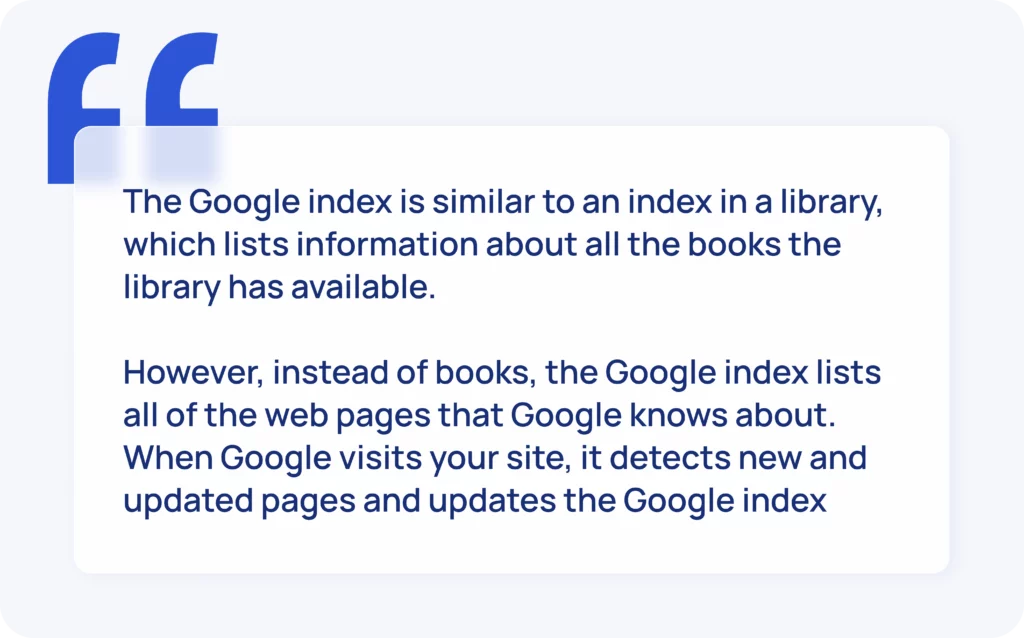
Source: Google
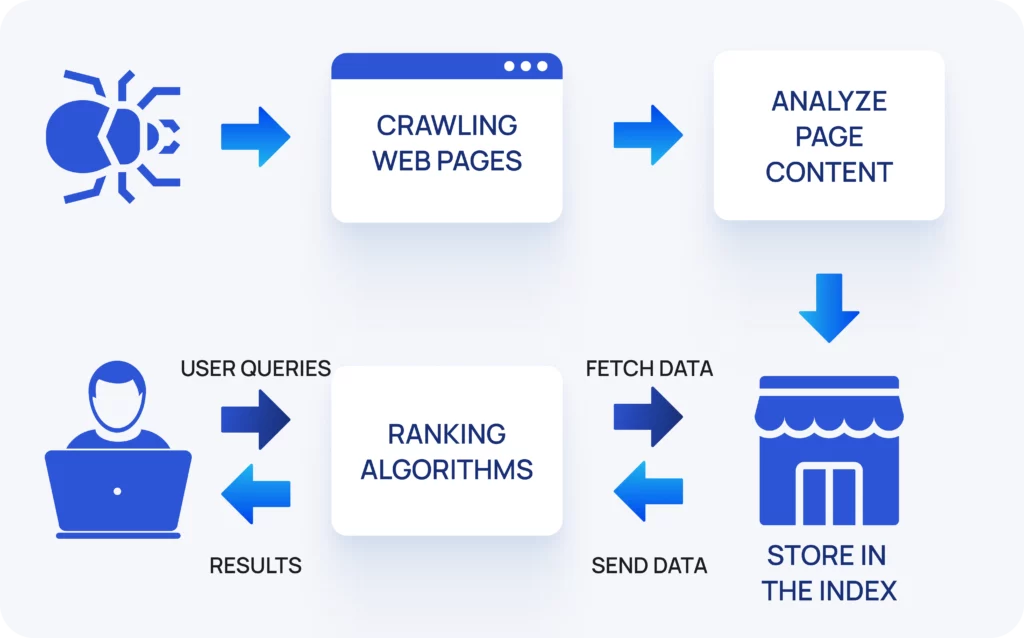
In other words, when search engines index backlinks, they recognize them as HELPFUL to users and include them in their ranking algorithm, propelling the visibility and authority of the linked websites.
💡Pro-tip! For search engines to understand how to index backlinks, they need to analyze how many sites link to a page, how trustworthy and credible those sites are, and whether their content relates to the page they're linking to.
If none of these factors reflect well on your site, your backlinks won’t be indexed. Hence, your link-building efforts won’t boost your rankings on search results whatsoever.
How Long Does Backlink Indexing Take?
The indexing process can vary widely, taking anywhere from a few hours to several weeks or even months, depending on the specific backlink and the site it’s coming from.
If you are more into exact numbers, here’s what the SEO community has on how long it takes to index backlinks:
- John Mueller, a Google Search Advocate, says most high-quality content is usually indexed within about 1 week or so.
- Onely’s research shows that, on average, 83% of pages are indexed within the first week, though delays are a common thing, so it might be up to 8 weeks.
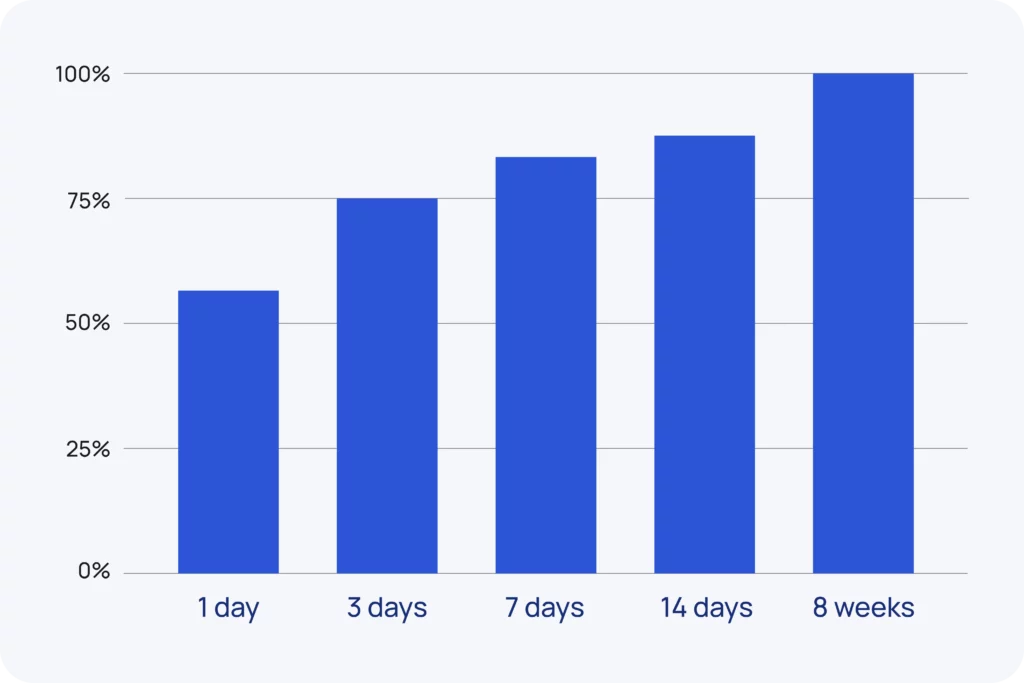
- According to Ahrefs, it takes 1-2 weeks to index a new website.
- Click Intelligence reports that most links are indexed at a 9% success rate, but this improves over time, with better rates at the seven-day, fifteen-day marks, and beyond.
🎤 Ask an expert!
“In your experience, how long does it take for backlinks to get indexed?”
Backlinks typically take anywhere from a few days to a few weeks to get indexed, though it can sometimes take up to 3 months, depending on the site’s authority and how frequently it’s crawled
In my experience, the indexing of backlinks can vary significantly, often ranging from a few days to several weeks. The time it takes largely depends on the authority of the linking site, the quality of the content, and how frequently the site is crawled by search engines.
According to Search Engine Journal, high-authority sites with strong content can see backlinks indexed in as little as 48 hours, whereas lower-authority sites may take up to several weeks or longer.
Furthermore, a study from Search Engine Land indicates that proactive measures like submitting the URL to Google Search Console and building internal links to the new backlink can speed up the indexing process.
However, it’s important to manage expectations, as indexing is not always immediate, and ongoing monitoring is necessary to ensure that links are eventually picked up by search engines.
Backlinks from authority sites like major news outlets often get indexed within a few hours to days because these sites are crawled frequently. In contrast, links from smaller, niche sites might take longer — sometimes weeks — due to less frequent crawling and lower visibility.
Let me answer by comparing a link from a reputable news website vs a local directory link:
Reputable news website: Authoritative, has a lot of traffic, has a (somewhat) controlled number of external outlinks – it probably gets crawled quite often and doesn’t have any issues getting pages indexed.
Whereas…Local business directory: Has somewhat decent authority with some level of traffic, but has millions of pages, – it’s unlikely your link will be crawled for a while (if ever)…
It is also worth considering how you are measuring. For example, if you are using Google Search Console – there’s normally a delay in 2-3 days before you get any data at all. Whereas other SEO tools may be able to pick the links quicker
You can also find plenty of insights in comment sections on platforms like Reddit or Quora.
- Some say backlinks index anywhere from 5 days to 5 weeks.
Depends a lot on the authority of the website backlinks are placed on. 5 days to 5 weeks in my experience
- Some believe backlink indexing can vary based on changing ranking factors, taking anywhere from 24 - 72 hours to as long as 4-6 weeks or even 4-6 months!
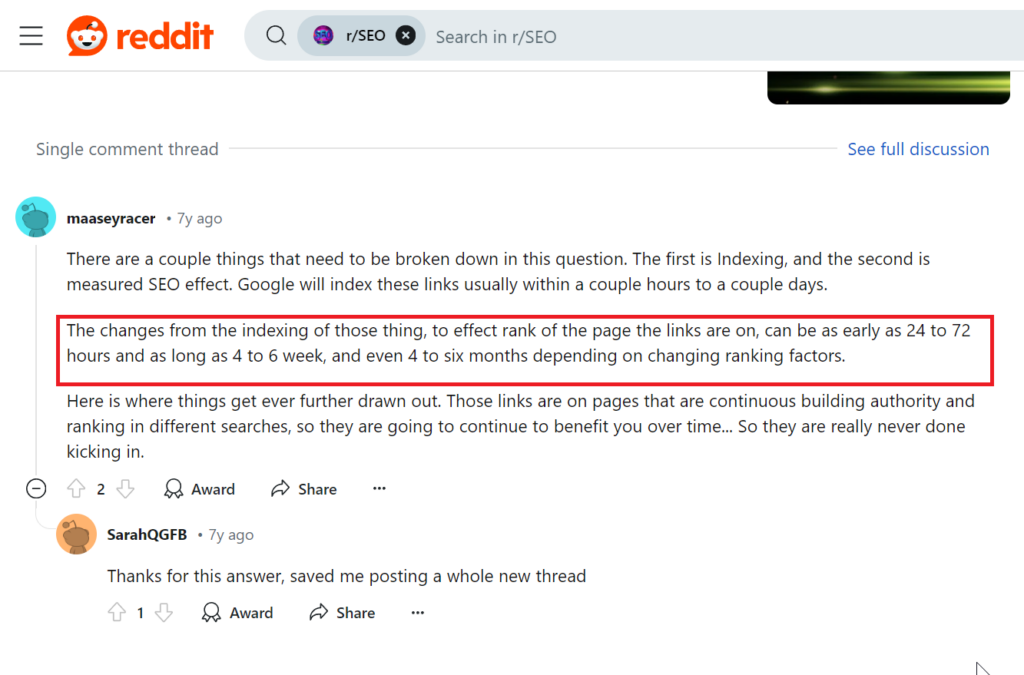
The last comment makes a lot of sense as it ties backlink indexing not just to the timing of technical crawling and storing websites but to the time it takes to see RESULTS from those backlinks.
As per our own survey of 113 SEO experts worldwide, backlinks typically take effect within 2-4 weeks, with 6 weeks being the maximum term stated by experts.
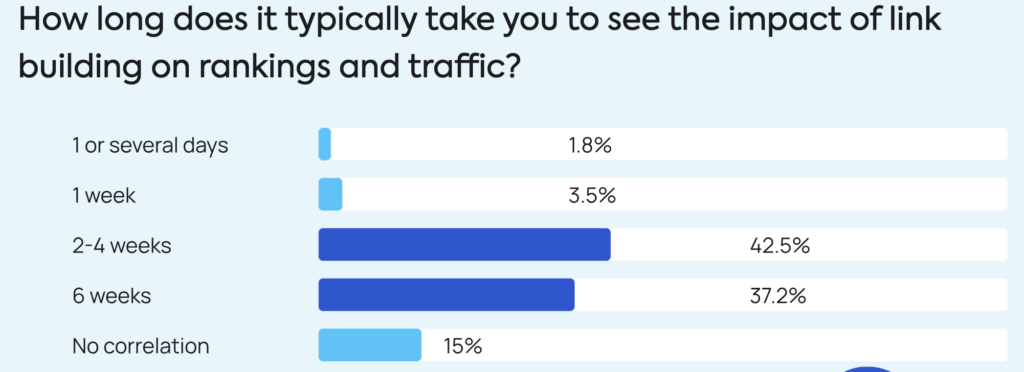
👉 More inside our post: How Long Does It Take for Backlinks to Take Effect?
Backlink indexing factors
Now that you’ve got a sense of how long it takes for search engines to index backlinks, here are a few more factors to consider while expecting things to work out.
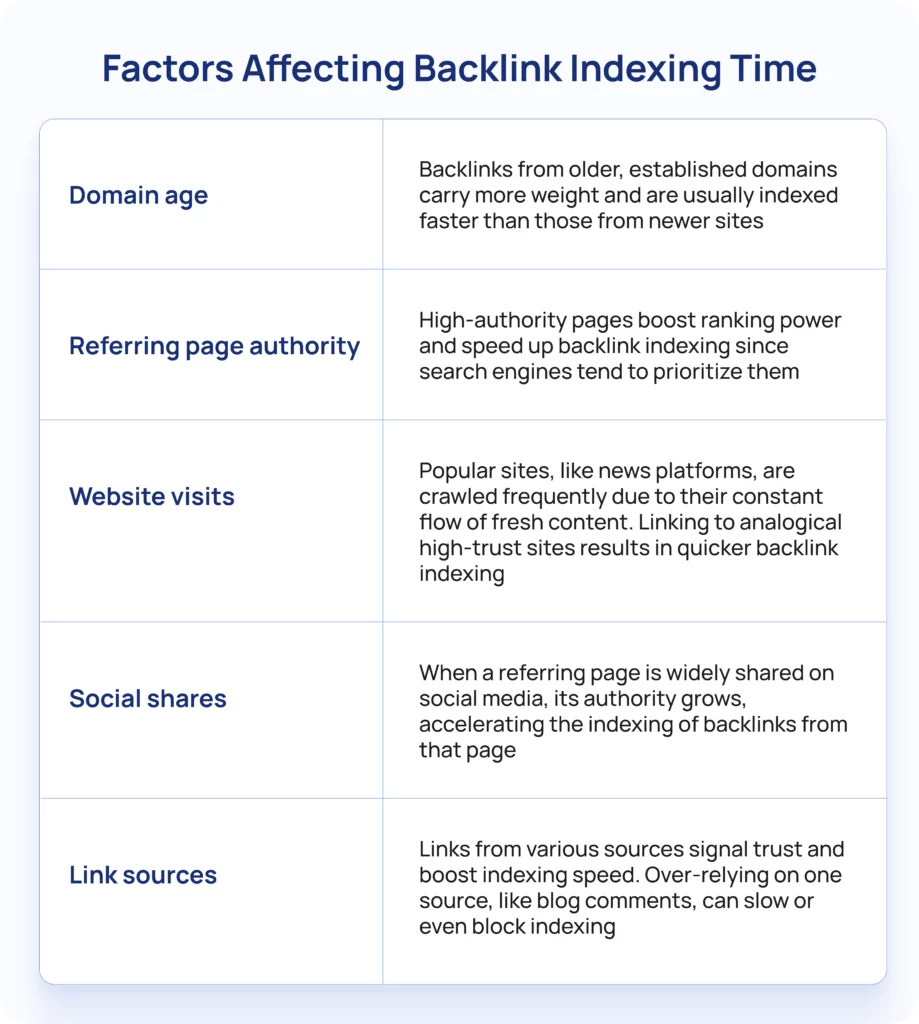
🎤 Ask an expert!
“What are the key factors impacting backlink indexing?”
Well, from what I’ve seen, this depends on a variety of factors such as: the quality of the website, the amount of traffic it gets, how deep the page is within the website, how many pages there are on the website, recent website performance (has it been hit by an algo update?), number of outlinks, content frequency, etc.
Why Are My Backlinks Not Indexing?
Before we dive into the reasons, here’s a silver lining for website owners dealing with poor backlink indexing metrics.
Onely’s recent research shows that 16% of major websites aren’t indexed AT ALL! Citing John Muller himself, Google WON’T INDEX all the existing pages on a website because:
“When it comes to indexing, we don’t guarantee that we will index all pages of the website. And especially for larger websites, it’s really normal that we don’t index everything. That can be the case that maybe we just index 1/10 of a website because it’s a really large website. We don’t really know if it’s worthwhile to index the rest”
Source: John Muller's Webmaster Q&A Session
So, if your backlink is on a LARGE website but isn’t getting the traffic you expected, it might be because search engines are overlooking it, just like they do with many other links from major websites. Count that as a reason #1.
Aaron Gray’s latest 2024 research shows that this is especially true for large news websites, which, according to his observations, have the worst indexing rates.
Think of sites like USA Today and The New York Times. I found this surprising, but I suspect that with the sheer volume of content they produce daily, Google may selectively index backlinks it deems most relevant for search engines.
💡Pro-tip! Sometimes, search engines assign a crawl budget to each site, influencing how often and how deeply they crawl it. For large sites with many pages, this can mean some backlinks may not get crawled or indexed due to these budget limits.
Anyway, here are more possible explanations for why search engines fail to index backlinks:
Partial indexing
Have you ever had a page indexed by Google, but your main content stays hidden? That's because of so-called “partial indexing,” which happens from time to time.
Take product descriptions on an e-commerce site, for instance — sometimes, they vanish on the mobile version. Why? The site isn’t optimized for mobile-first indexing, so search engines can struggle to crawl and index those relevant backlinks.
Discovery failure
Occasionally, your backlink indexing metrics might suffer if search engines detect your link but don't advance it in the indexing process. In Search Console, you might notice this issue labeled as "Discovered, but not indexed."
This can happen for a variety of reasons:
Low-quality content on the source site
If the site hosting your backlink has a lot of low-quality or spammy content, search engines may be less likely to index those links.
Duplicate content
If the page with your backlink has duplicate content, search engines may index only the most authoritative version, potentially ignoring backlinks on less significant pages.
Here’s how John Muller explains the indexing of duplicate content:
“We’re trying to recognize duplicate content in different stages of our pipeline. On the one hand, we try to do that when we look at content. That’s kind of like after indexing – we see that these two pages are the same, so we can fold them together”
Source: John Muller's Webmaster Q&A Session
Low-priority URL
Google gives each URL a crawling priority, so less important ones might get skipped and never crawled. What affects a URL’s priority? Things like how fresh and popular the content is, and how fast your server responds — slower servers can slow down indexing.
No-follow links
More often than not, backlinks with a "nofollow" tag might get indexed less frequently by search engines than "dofollow" links. Here’s a quick example to get you up to speed.
Say you’ve got a site selling artisanal coffee and just posted a killer blog on unique brewing methods. You get a nod from a top food blog to link back to your article, but they slap a "nofollow" on it.
🤔 What’s next?
When search engines encounter a "nofollow" link on a referring blog, they’re directed not to pass on link authority or PageRank. While the link might be indexed, it won't boost your page’s ranking power. Consequently, it may be ignored in indexing and updates.
Broken links
If your backlink is broken or leads to a dead page, search engines won’t be able to index it.
For example, if you have a gourmet cooking site and score a backlink from a top food magazine, but it turns out to be broken, search engines won’t be able to index it or pass any value your way. They’ll just register the error and move on, leaving your SEO untouched.
No-index & Robots.txt tagging
This often happens during website development when developers or SEOs accidentally block a page with a robots.txt file or "no-index" tag, causing search engines to skip indexing the content and backlinks.
For instance, if you run an e-commerce site and a developer accidentally adds a "no-index" tag to your blog section, search engines won’t index those posts or the backlinks. Even top-notch backlinks won’t help your SEO if search engines are told not to index or follow them.
🎤 Ask an expert!
“What are the top reasons backlinks might not get indexed?”
If backlinks aren’t getting indexed, it could be due to a few factors like being on low-quality sites, lacking context or relevance, infrequent crawling of the page, or issues like no-follow tags and blocked pages. It’s always good to check these aspects early to troubleshoot indexing problems.
The most common backlink indexing issue in the past few years is definitely the content being too generic or repetitive, as Google’s algorithm is becoming more and more smart in detecting low-quality pages.
On the other hand, there are more specific indexation issues like the linking page being closed for crawling in robots.txt to prevent spam bots from accessing the domain, and technical challenges such as specific directives in HTML not being overridden by rendered JS.
Additionally, if the linking page has a dynamically generated URL with parameters, the backlink in it might not get indexed, especially if the page is perceived as a duplicate or non-canonical page
The common reasons backlinks may not get indexed include:
- Placing the link on low-quality or spammy sites.
- Pages not being crawled frequently by Google, often due to poor internal linking or a lack of authority.
- Links placed on pages with no-index tags or pages blocked by robots.txt (This should be discussed with the partner site).
- Placing the link on a slow-loading or poorly optimized website, which can prevent crawlers from indexing it.
From my experience, I can name the following:
Low-quality or irrelevant sites
Backlinks from websites with low domain authority or poor-quality content are often deprioritized by search engines, which can delay or prevent indexing altogether. According to a study by Ahrefs, around 91% of content gets no organic traffic from Google, often due to the poor quality or irrelevance of backlinks pointing to it.
Lack of crawling frequency
Websites that aren’t crawled frequently by search engines may cause delays in backlink indexing. If the linking site has a low crawl rate, it could take weeks or even months for the backlink to be discovered. Google’s John Mueller has pointed out that crawl frequency is influenced by factors such as website freshness and the importance of the content.
Spammy link profiles
Sites with a history of spammy link-building practices are often flagged by search engines, which may delay or ignore the indexing of new backlinks. A recent study from Moz highlights that sites with a higher spam score are more likely to have their backlinks devalued or not indexed at all.
Technical issues on the linking page
Technical issues such as incorrect use of the no-index tag, broken links, or JavaScript that hides links from crawlers can prevent backlinks from being indexed. Google has emphasized the importance of ensuring that backlinks are visible to crawlers by keeping the linking page’s code clean and accessible
🎤 Ask an expert!
“What are the major factors that contribute to backlinks being de-indexed, and how can SEO professionals prevent this in 2024?”
There are numerous potential factors leading to backlinks being demoted from search. In an era of frequent Google Updates, counterfeiting variables may include low-quality content, spammy links, broken pages, NoFollow attributes, and outdated or slow web pages.
SEO pros should focus on catering high-quality, valuable content and ensure links come from reputable and relevant sources. Regular backlink audits are crucial, and maintaining a well-performing, up-to-date website can help keep links indexed and avoid penalties from search engines
If Google is de-indexing backlink pages it usually means it wasn’t on a high value page to start with, and there’s not enough useful or helpful content on there. SEO pros can prevent this by aiming to get high-quality backlinks, on relevant pages in relevant publications. Ensuring you are not just getting a link but also providing unique and relevant content and context around the link is another way to support your efforts
Backlinks are most commonly de-indexed simply because of content removal or site updates that eliminate the link. Other factors include the referring domain or page being penalized or deindexed, low-quality or spammy link sources, and excessive redirects.
To prevent this in 2024, SEO pros should focus on acquiring backlinks from reputable, authoritative websites, avoid link schemes, and regularly monitor backlink profiles and key pages for changes using specialized tools to ensure important links remain live and relevant.
How to Index Backlinks Fast in Google
With all that in mind, you have two options on how to index backlinks: either let Google do it at its own pace or give it a little push. Nothing’s off-limits — just taking a proactive approach can really make a difference! Here’s how you can get started.
Use backlink indexing tools
No need to fear automating your SEO efforts — there’s nothing from black hat link building in there. Backlink indexing tools are specifically designed to help you:
Verify backlink indexing
Just provide the link, and the tool will automatically confirm whether it's indexed by search engines.
💡Pro-tip! Some backlink indexing tools don't just verify if your backlinks are indexed — they assist in indexing them for you through:
1) “pinging” URLs to inform search engines your backlinks exist.
2) auto-submitting backlinks to high-authority sites for better visibility.
3) devising sitemap submissions to speed up backlink discovery by search engines.
Track backlink performance
Keep an eye on which links are bringing results and which aren’t, so you can concentrate on the high-quality ones that drive more traffic and boost your rankings.
Spot & address issues
These might cover possible technical issues like broken links, backlinks from spammy sites, or anything that can hurt your SEO health.
Refine your link-building plan
Upon monitoring which links are indexed and performing well, you can strategically look up similar opportunities.
💡Pro-tip! Looking for a reliable backlink indexing tool though feeling lost in options? Here are our best picks for you!
🎤 Ask an expert!
“What are the most effective tools or strategies for monitoring and speeding up backlink indexing?”
To monitor and speed up backlink indexing, tools like Google Search Console, Ahrefs, and Semrush are highly effective for tracking backlinks and ensuring they remain indexed. Not to mention good old internal linking efforts, they can inherently help streamline new backlinks and encourage faster crawling. Sharing content on social platforms and keeping linked pages updated also helps accelerate the indexing process.
To monitor your backlinks, there are many SEO tools like Google Search Console, Ahrefs, and Semrush, where you can track new backlinks you’ve received. These tools will also tell you which backlinks you’ve lost, have been redirected, or that turned into a broken page to see how that’s impacted your SEO performance.
Team up with website owners
Sometimes, SEO isn’t just about the tech — it's also about forging strong connections. Here’s how teaming up with webmasters can work to your advantage.
Fix issues
Whenever you spot a backlink of yours that's either been blocked from indexing or has a "nofollow" tag, just let the website owner know about it right away. Kindly ask them to fix it so that search engines can properly index the backlinks you've shared.
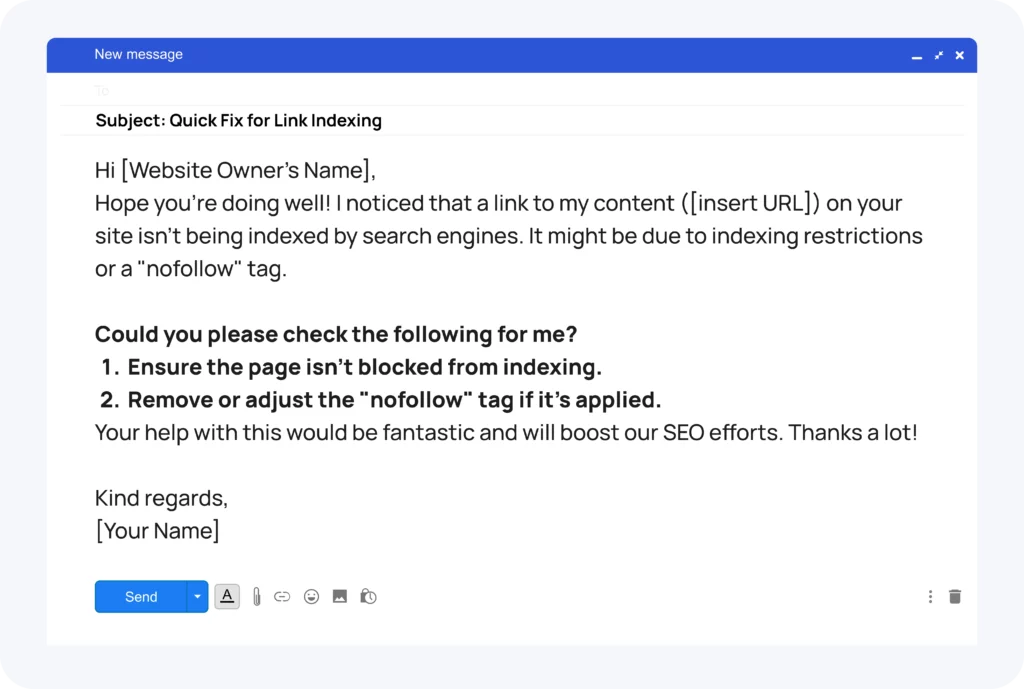
Request URL inspection
Sometimes, reaching out to website owners can be more about getting a little extra help than just fixing an issue. For example, if you noticed that your guest post hasn’t been indexed already for two weeks, you might ask if they could assist by using the URL Inspection Tool in Google Search Console to help get that backlink indexed.
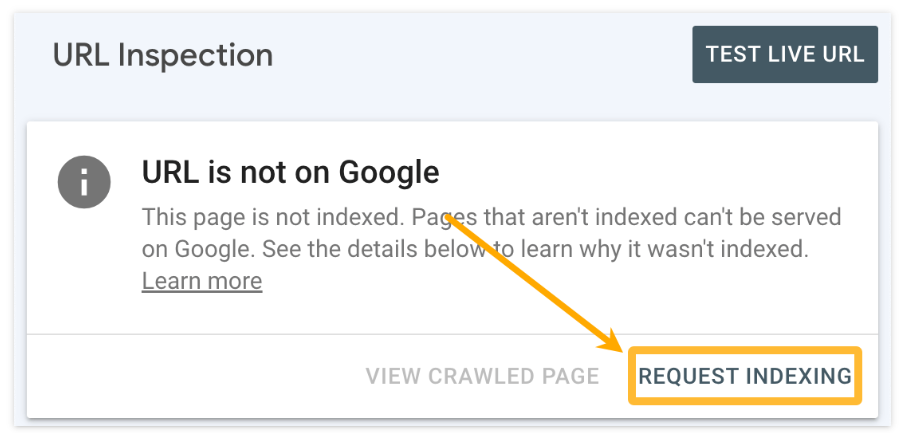
Of course, you’ll need a solid relationship with the webmaster for this, as Google Search Console only allows index requests for domains you own or manage. So, before asking them to click “Request Indexing,” ensure they’re on board and willing, thanks to your previous interactions.
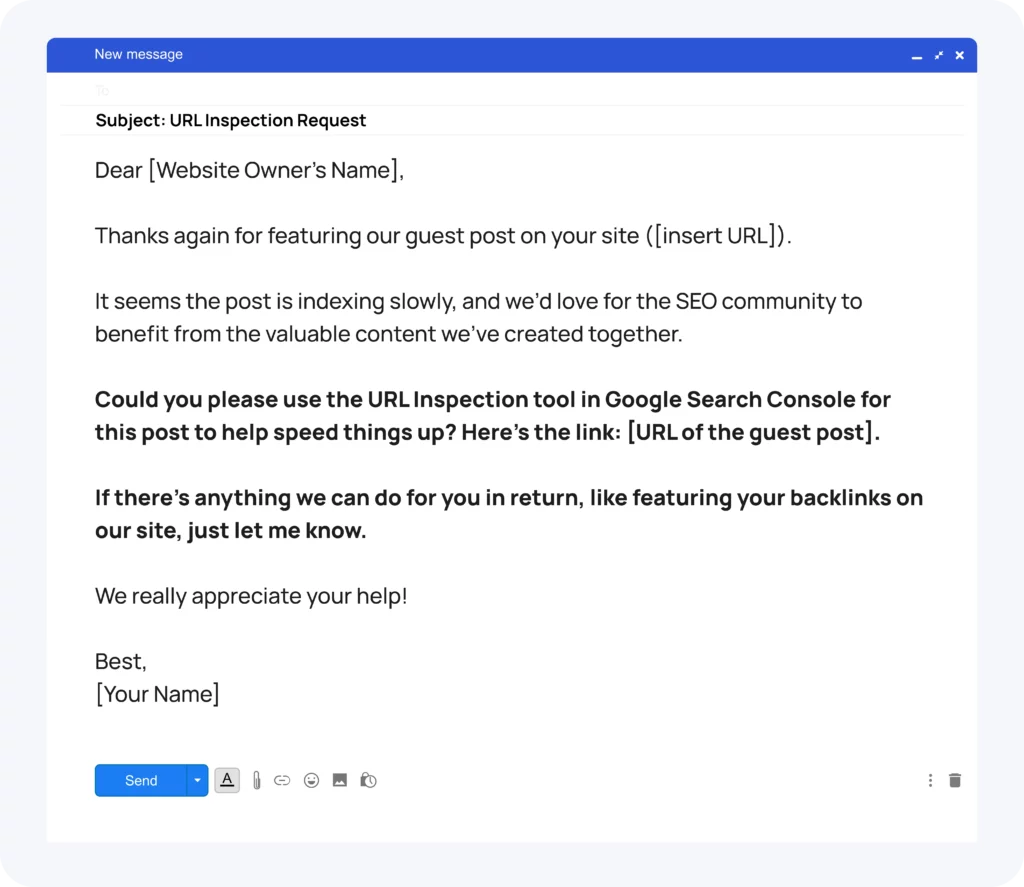
Ask for internal linking
Requests for internal linking is another great way to answer “How to index backlinks fast in Google?”. Say, you’ve just published a guest post. You could try negotiating with the website owner to add links from other pages on their site to your guest post. This is particularly effective if those pages are high-traffic and well-ranked. Such an approach not only helps with faster indexing but also boosts the internal link authority of your guest post.
💡Pro-tip! Exchanging links with sites that can amplify your content is a fantastic way to boost indexing. For instance, we recently mentioned an SEO expert in our blog posts, and that mention got featured in their resources and even their high-traffic newsletter!
🎤 Ask an expert!
“What are the most effective tools or strategies for monitoring and speeding up backlink indexing?”
Whilst you can (if you have Google Search Console access to the site) request a new page for crawling manually, oftentimes the quickest way to get backlink pages indexed is to ensure they have strong internal links within the website. To give them a starter boost you can place them on the homepage, main menu, or footer menus as it’s more likely that Google will crawl them more quickly than on a random blog post link.
Target high-quality websites
It’s a fact that influential, credible websites often get indexed quickly simply because they’re crawled more frequently. Since DA remains a key ranking factor, securing high authority backlinks is crucial for faster indexing. To help you locate high DA websites, make use of various tools like Ahrefs, Moz, or Semrush available online.
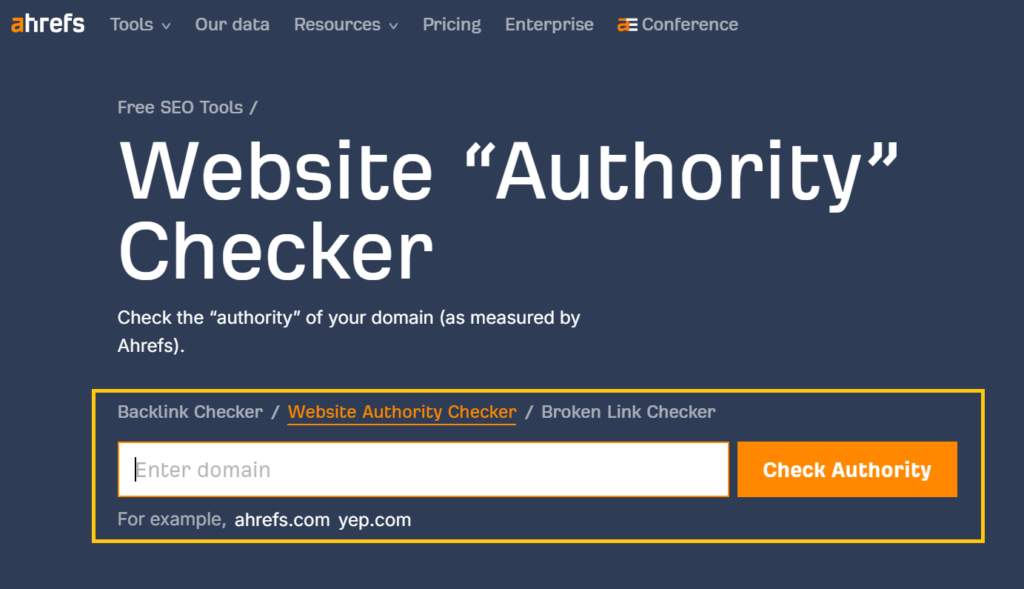
Alternatively, consider using the services of a professional link-building agency like Editorial.Link. With our proven track record of partnering with high-authority sites like podium.com, monday.com, namecheap.com, envato.com, and more, better indexing is just one powerful link away!
💡Pro-tip! Linking to a low-quality, spammy website can spell trouble for your indexing and rankings. Google's algorithms are quick to spot spammy links, and you could find yourself facing penalties or even getting deindexed. Here’s what you need to avoid to see your backlinks index faster.
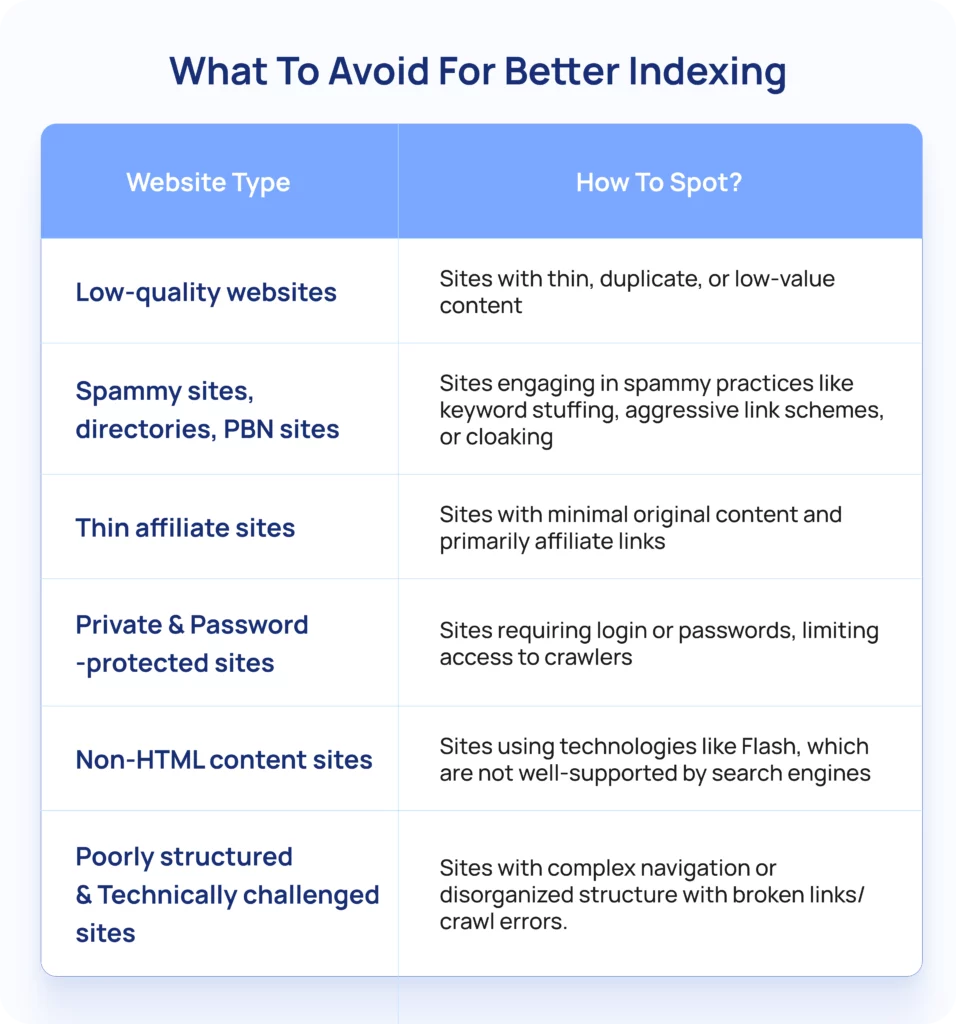
🎤 Ask an expert!
“Are there specific types of backlinks (e.g., from niche sites or high-authority domains) that get indexed faster? Why?”
While we don’t have much control over how quickly our backlinks get indexed because they’re on external websites, there are some strategies we can try. It may be helpful to earn backlinks from authoritative websites because Google prioritizes crawling websites that receive a lot of traffic so they may pick up your backlink quicker. You can also try sending more signals to Google that your backlink exists by linking to it from your website’s press page or by sharing it on social media.
Try tiered link-building
Tiered link-building is still very much in play in 2024, and it remains a powerful strategy for boosting the authority and indexing of your backlinks. Think of it as a ladder where each step supports the one above it, channeling more "link juice" up to the top.
Say, you’ve snagged a link on a top-notch site like CNN. Here’s a simple way to make the most of it with tiered link-building:
👣 Step 1
To boost your primary backlink, try adding tier 2 links from relevant but less authoritative sources to your page. For this, write articles or blog posts on less authoritative but still relevant sites and include backlinks to CNN, your major traffic source. This is how you can “support” your tier 1 backlink, making it more visible and authoritative in search engines’ eyes.
👣 Step 2
Once you’ve set up your tier 2 backlinks, you might start seeing additional links from social media posts, blog comments, or forums. While such tier 3 backlinks might be no-follow, they still drive traffic and increase visibility for your tier 2 links.
👣 Step 3
Enjoy better indexing! Search engines are pretty quick at noticing how many pages link to your primary page, so NOW they know that your content is worthwhile and deserves to be seen.
🎤 Ask an expert!
“What are the most effective strategies for speeding up backlink indexing?”
One of the most effective ways to get your backlinks indexed is by using a tiered linking strategy. This involves creating links from third-party websites to your existing backlinks, such as a guest post. Instead of linking directly to your website, you link back to the guest post, which helps strengthen and index the original backlink.
Leverage social media
User signals, like direct traffic, can boost your rankings galore, and a lot of that comes from sharing your links on social media. More impressions, clicks, upvotes, and shares give your content a real advantage.
Posting articles with your backlinks on social media is one of the best ways to speed up indexing. Everyone knows that including backlinks in Twitter (now X) posts works wonders, thanks to Google’s partnership with Twitter since 2015.
Another great option is LinkedIn — its domain is so powerful right now that even less-than-perfect content gets indexed and ranks high, simply due to its high DR. Don’t miss out on this chance.
For example, many experts featured in our articles often share direct links to them in their LinkedIn posts, generating not only shares, likes, and comments for our company page but also driving traffic to the articles.
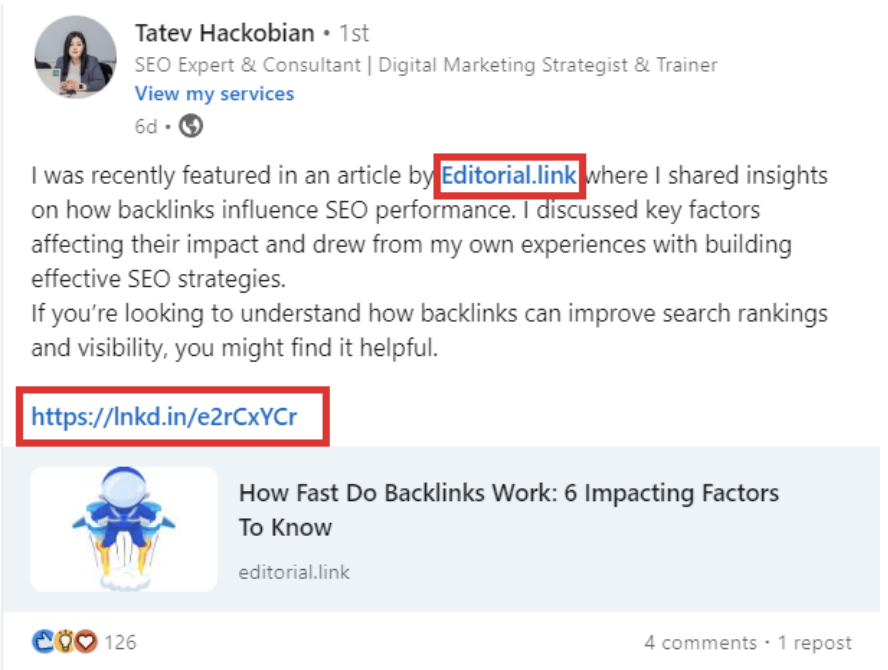
🎤 Ask an expert!
“What are the most effective tools or strategies for monitoring and speeding up backlink indexing?”
First and foremost, share or reference the page containing the backlink on social media or high-engagement platforms through relevant posts or content (avoid spamming). You can also speed up backlink indexing by building a small number of external backlinks from other relevant and reputable sites back to the page containing your link. Last but not least, you can take your backlink index speed to the next level by suggesting relevant internal links from other top pages within site hosting your new backlink.
🎁 And for a little extra bonus, check out Peter Rota’s recent LinkedIn post for some awesome backlink indexing tips!
It’s unlikely Google will 100% index every page on your site, but here are 11 ways to help:
– Make sure the content on the page is as unique as possible.
– If you have similar content and or keywords, try consolidating and combining pages together.
– If you’re using AI content, try to add additional insights and or unique takeaways to make the content stand out and help with information gain.
-Before you create a new page on the site, research what is ranking on that topic and if you already have a page that meets that intent.
– If the page returns a soft 404, remove and redirect it to the most relevant page.
– If the page is important and you want it indexed, make sure it returns a 200 status code.
-When possible, try to have a unique title tag and h1 header when possible for each page. Google may view these pages as not unique if there are multiple pages with the same title tags and h1s.
– Make sure that if it’s an important page on the site, it’s not an orphan page and has at least one internal link.
– Try to ensure that the page is no more than 3-4 clicks from the root domain of the site.
– Employ HTML breadcrumbs to make it easier for Google and the search engines to crawl your site.
-Make sure each page has a rel canonical by default
Lastly and maybe most importantly, DO NOT obsess over every piece of content being indexed on your site. You will end up driving yourself crazy.
What else would you add to this list?
Final Words
Backlink indexing can be a game of hours, days, weeks, or even months, depending on your current SEO standing and various other factors we’ve discussed. But don’t let these hurdles get you down — there are ways to speed things up if you stay on top of all the essentials.
For extra tips, check out Editorial.Link. We’re here to dive into your specific case and give you the solutions right when you need them!














